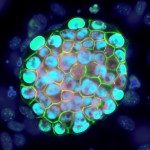Link to Pubmed [PMID] – 28947813
Sci Rep 2017 Sep;7(1):12285
Inner cell Mass (ICM) specification into epiblast (Epi) and primitive endoderm (PrE) is an asynchronous and progressive process taking place between E3.0 to E3.75 under the control of the Fibroblast Growth Factor (FGF)/Extracellular signal-Regulated Kinase (ERK) signaling pathway. Here, we have analyzed in details the kinetics of specification and found that ICM cell responsiveness to the up and down regulation of FGF signaling activity are temporally distinct. We also showed that PrE progenitors are generated later than Epi progenitors. We further demonstrated that, during this late phase of specification, a 4 hours period of FGF/ERK inhibition prior E3.75 is sufficient to convert ICM cells into Epi. Finally, we showed that ICM conversion into Epi in response to inhibition during this short time window requires both transcription and proteasome degradation. Collectively, our data give new insights into the timing and mechanisms involved in the process of ICM specification.




